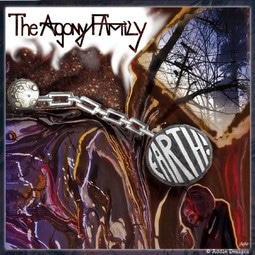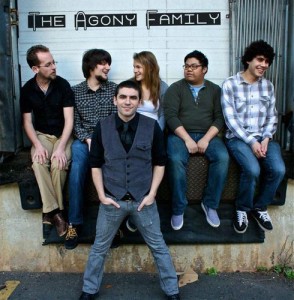Artist: Agony Family
Album: Earth!
The Agony Family’s Earth! is an album of mainstream impulses. It’s pleasant, it’s easy to like (if you don’t recoil at synthesizers and glossy guitar in your pop music), but it’s a tough sell as something truly great, and as my favorite album of a strong musical year. I’ll make multiple awkward  stabs at it. My first is to discuss a pop song I wish I could like more than I do, the biggest hit song of 2012: Carly Rae Jepsen’s Call Me Maybe.
stabs at it. My first is to discuss a pop song I wish I could like more than I do, the biggest hit song of 2012: Carly Rae Jepsen’s Call Me Maybe.
For 28 seconds, it could be Jepsen’s voice singing a milder Agony Family song. The gently percussive bowed strings; a vocal melody that covers a modest range but darts around it in not-quite-predictable ways; the beginnings of a quiet drum machine part that clicks and ducks around the obvious beat as the singer gets a small bit more intense; the whooshing noise building up for the next section of music. Statistically, there’s a good chance you like what happens next a lot better than I do: over 32 seconds, over a metronome-simple beat, she sings the exact same four-measure melodic sequence four times in a row, ending each repetition with “So call me maybe”.
She returns directly to the verse melody. The melody’s a bit lazier this time, but that itself is variety, and the strings are augmented by a busier, still-soft drum machine; it’s nice. Then she sings that four-measure chorus melody four *more* times, each time ending in “So call me maybe”, and perhaps the arrangement isn’t a literal cut-and-paste from the first four times, but that’s what it sounds like to me. A 16-second vocal bridge repeats a barely-different melody, though the delivery’s more intense and there’s a welcome staggering of the rhythm; for 8 seconds the strings are brought up loud for the first time and her voice echoes and bounces; the Agony Family could have produced those 24 seconds, why not? It leads into her four-measure chorus being sung once over different backing music, at least. Then she sings that chorus melody four more times in a row. With pretty much the same old backing music. Earning a small gold star for only saying “Call me maybe” on *three* of them.
Part of my issue — you’ve guessed this, yes? — is that I don’t want to hear the exact same 8 seconds of melody thirteen times in a three-minute song. Especially with the metronomic beat, doing its best to literalize the feeling of having it pounded into my skull. But the lyrics annoy me too. “I’ve just met you/ and this is crazy/ but when you and your fiancee get married next month/ I’m going to slash my wrists in front of you so you feel guilty about choosing her” would live up to its billing. “This is crazy”, said about inviting an interesting stranger to call you, is boringly false — unless he has, say, a government-mandated forehead tattoo announcing POOR IMPULSE CONTROL. “So call me maybe” is coy and equally false. It might not be with a different delivery, cracked with pauses, the “maybe” mumbled barely audibly as the speaker remembers, oh wait, possible rejection is terrifying. But Jepsen can handle that risk, she can assert her confidence every 8 seconds; and since that confidence is healthy, why gigglingly pretend to something weaker every 8 seconds?
Feel free to disagree. I own enough They Might Be Giants, XTC, and Loud Family records to prove I can enjoy self-undermining too as long as it’s clever, witty, or idiosyncratic. But the Agony Family traffic in absolute sincerity, in a fearlessly complete rejection of coyness and irony that I can’t help admiring. And musically, their songs evolve and build in ways that, while always organic-feeling, are careful to make every second matter. The verses are as interesting and melodic as the choruses. So are the pre-choruses. Sometimes the bridge or the coda takes on a life of its own and makes a case for itself as the song’s truest center. Sometimes the backing vocals do; sometimes the instrumental hooks do. (And while I’m not personally the audience for guitar solos somewhere between Pink Floyd’s David Gilmour and Bon Jovi’s Richie Sambora, the solos are short and also very good). The rhythms are 4/4, but all the basic tricks like syncopation and grace notes and rolling triplets and arpeggiation and tremolo are used to make 4/4 involving: Earth! is among other things excellent dance music, the pulse firm but giving a body prompts worth new responses.
So, uh… what do they *sound* like? As I’ve hinted, they’re rather ’80s-sounding — though Pitchfork-aware young’uns among you can imagine M83 working with Arcade Fire instead, or Cloud Cult picking up tricks from Robyn — but they incorporate many things. Synthesizers and guitar gloss especially, but also plenty of piano, bowed  strings, vocal harmonies and duets, arena-metal bass and drums. To make U2 a comparison point, you’d need the sonic innovation of Achtung Baby, the widescreen depth of Joshua Tree, and the naive urgency of Boy all at once. The cinematic triumphalism of Vangelis, the lurking creativity of Some Great Reward-era Depeche Mode, and the cool of Donald Fagen’s the Nightfly would all be relevant to their synthesizers. Runner shares a genre with Total Eclipse of the Heart; I Stop Clocks is like Coldplay with an actual song inspiring and egging on their sonics; Rebuild Yourself is two minutes of blunt-force heavy metal as geeky motivational jingle. These too-simple comparisons are coming out badly; I will stop them. I should mention There Again, though, the cyborg sounds and rapping on which are the album’s only goofiness: it’s my favorite song here, both for its fun and because it proves their seriousness is a choice. There Again is still a basically serious (and melodic) song, though.
strings, vocal harmonies and duets, arena-metal bass and drums. To make U2 a comparison point, you’d need the sonic innovation of Achtung Baby, the widescreen depth of Joshua Tree, and the naive urgency of Boy all at once. The cinematic triumphalism of Vangelis, the lurking creativity of Some Great Reward-era Depeche Mode, and the cool of Donald Fagen’s the Nightfly would all be relevant to their synthesizers. Runner shares a genre with Total Eclipse of the Heart; I Stop Clocks is like Coldplay with an actual song inspiring and egging on their sonics; Rebuild Yourself is two minutes of blunt-force heavy metal as geeky motivational jingle. These too-simple comparisons are coming out badly; I will stop them. I should mention There Again, though, the cyborg sounds and rapping on which are the album’s only goofiness: it’s my favorite song here, both for its fun and because it proves their seriousness is a choice. There Again is still a basically serious (and melodic) song, though.
What are they serious about? Introspective outsider adolescent romantic things. (Lead singer/keyboardist Greg Scalera’s voice is good for this: flexible, impassioned, and on-pitch but sorta nasal and geeky, like if John Linnell had fronted Simple Minds instead of They Might Be Giants. The various female singers brought in are reliably outstanding in a more traditional Ellen Foley or Broadway-lead manner.) Their romanticism isn’t mine — I’m afraid that if I’d written passionate teenage songs they’d’ve been about Detroit Tigers infielders, progressive tax rates, or the twists and perils of interplanetary diplomacy — but it’s theirs, which is what matters. There’s the desire for escape. There’s devoted love. There’s a non-blaming approach to failed love, in several songs. There’s the urge to self-improvement. There’s early awareness of death, and for a multi-racial New Jersey band I can’t assume it’s goth posery, although it’s got that sort of morbid yearning.
I don’t quite get how this 96-minute double CD earns the title Earth!, but they step outside themselves long enough to sing nostalgically about a love in 1973 (when none of the band members existed); long enough to summarize a soldier’s career with the harsh sympathy of “Go ahead, see the world, tear it to pieces/ Go ahead, see the world, but never forget what you did”. If I like Scalera’s lyrics, it’s not because they read like anything special (they don’t), but because of who’s singing them; because the singers care enough about them to refract and re-use phrases across different songs and contexts; and because it’s all to such splendid music.
Double-cd’s are hard to rate, but even the songs I like least here — oddly, the first four songs on disc one — are fine. Make me compress Earth! to half its length, and it’s still my favorite album of 2012 if I’m choosing which songs. I didn’t expect it to be this year’s #1 for most of the countdown; it’s likable, but it doesn’t seem extraordinary. Until every measure of its running length has been allowed, enough times, to play its own distinct part.
– Brian Block
To see the rest of our favorites, visit our Favorite Albums of 2012 page!
